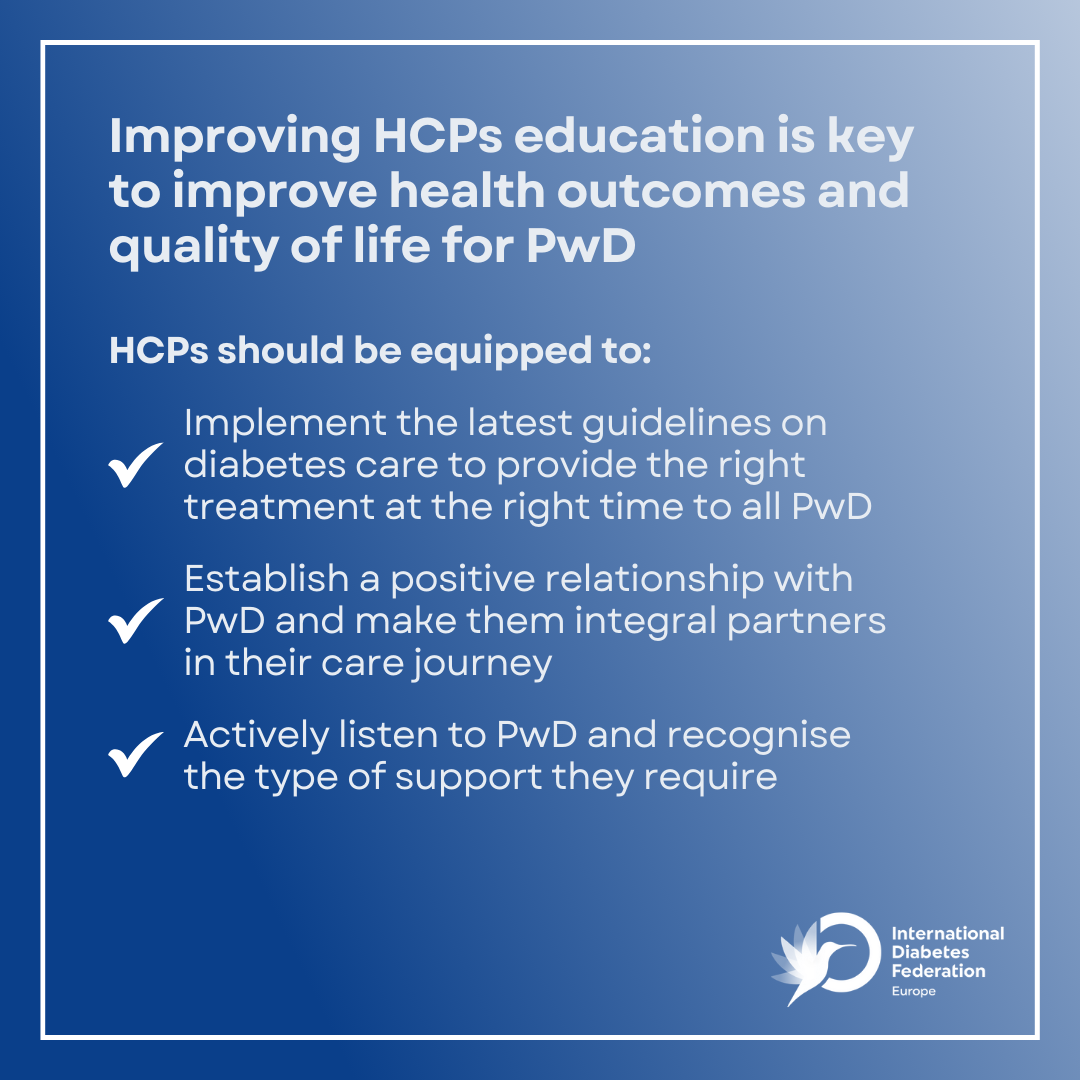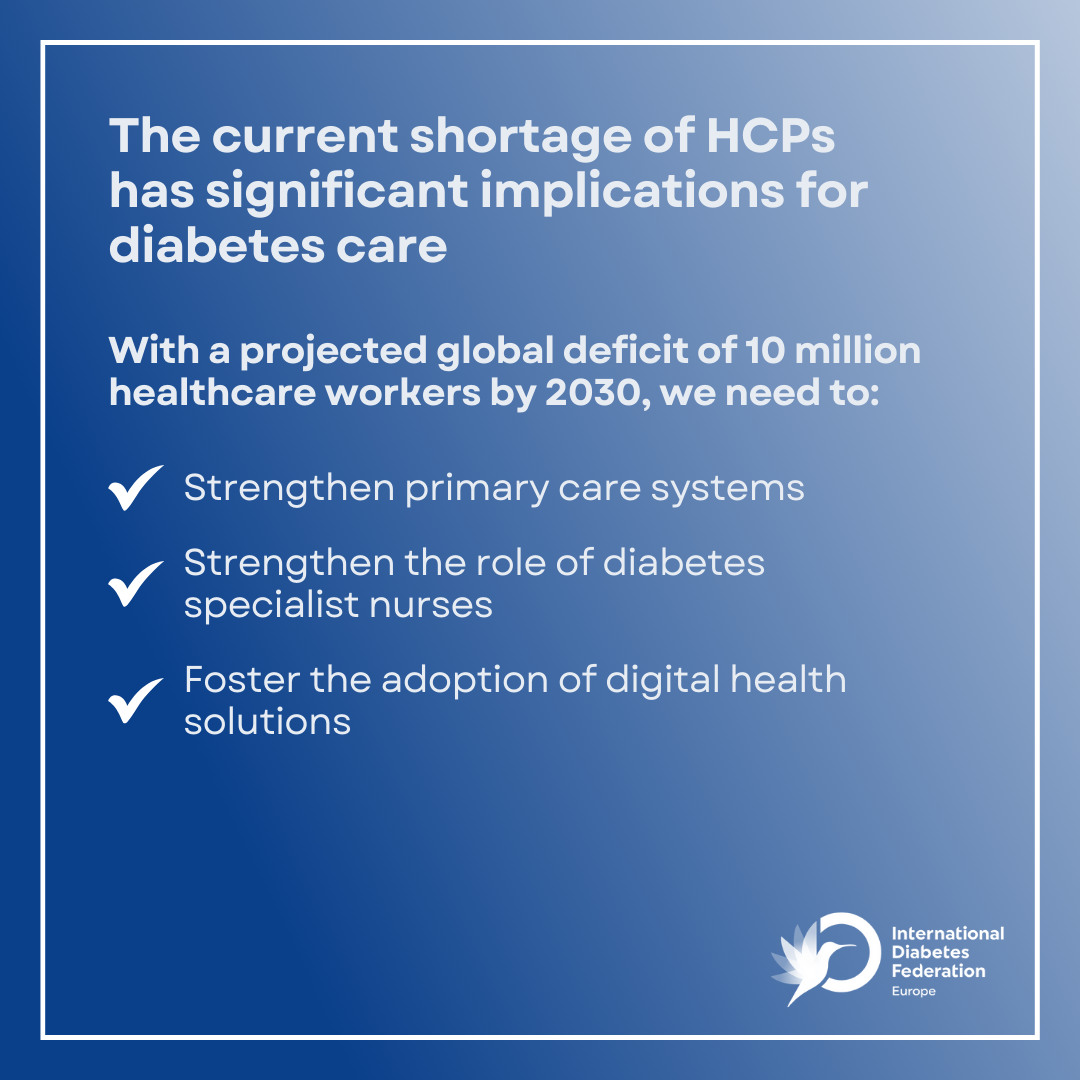Improving HCPs’ education to improve health outcomes and quality of life for PwD
Diabetes is a complex condition the management of which necessitates collaboration across a multidisciplinary team of care providers as well as adequate knowledge and education on the part both of PwD and HCPs.
The comprehensive education of HCPs is a key element underpinning the delivery of high-quality diabetes care. Primary care professionals (PCPs) play a particularly crucial role in diabetes prevention and care as they represent the first point of contact for PwD. Not only do they manage the care of the vast majority of people living with T2D but they are also ideally placed to identify people at risk of developing the condition and provide them with the right treatment at the right time according to the latest evidence-based recommendations on diabetes care. Despite this, several barriers often prevent PCPs from translating scientific evidence into practice. These include, for example, lack of time, competing priorities, lack of familiarity with new treatments and misperceptions about PwD’s adherence to treatment. With about half the PwD not achieving their targets, fostering timely access to the right treatment is crucial to enable the prevention of diabetes-related complications and help PwD achieve the best possible quality of life.
HCPs education should be strengthened to reflect the need for equipping them with the right tools to implement the latest diabetes treatment guidelines, tackle clinical inertia and ultimately lower the risk for PwD of developing life-altering complications.
The comprehensive education of HCPs should also enable them in establishing a positive relationship with PwD, as this is a key driver of health outcomes, and PwD empowerment. HCPs should actively engage in shared decision-making and make PwD integral partners in their care journey. PwD should receive accessible information about their treatment to optimally manage their condition on a daily basis. They should feel free to ask questions and should not fear judgement. For HCPs, it is crucial to actively listen to PwD’s perspectives, taking into account their unique circumstances and recognising the type of support they require including, for example, the need for psychological support.
Fostering the adoption of digital health and strengthening the role of diabetes specialist nurses to tackle HCPs shortages
The need to strengthen HCPs’ education to adequately support PwD in achieving optimal health outcomes goes hand in hand with the urgent need to address the current shortage of healthcare workers. By 2030, the World Health Organization (WHO) projects a global deficit of 10 million healthcare workers. This shortage has significant implications for diabetes care.
Given the key role of PCPs and that of the other care workers who are integral part of the multidisciplinary teams supporting PwD, an under-resourced, underfunded and understaffed primary care system is a major obstacle to the effective prevention, management and treatment of diabetes and contributes directly to a care deficit and higher disease burden for PwD.
Currently, one third of PwD are undiagnosed. The lack of staff at the primary care level negatively affects PCPs’ ability to diagnose PwD and identify people at risk of developing the condition. Once diagnosed, PwD require regular routine checks and screening for complications as well as structured education and support from care workers to be able to make informed decisions and optimally manage their condition on a daily basis. Understaffing can undermine the ability of health systems to conduct regular checks for all PwD. In England, for example, it is estimated that, in 2021-22, less than half of PwD received all the required checks.
Diabetes specialist nurses (DSNs) play a key role in diabetes prevention, management and care. They are often tasked with educating PwD on self-management techniques and lifestyle changes, and generally supporting them in their journey. Despite this, they often do not receive specialised academic training in diabetes and, in most countries, are not allowed to prescribe medications. DSNs’ role, availability and workload are also inevitably affected by the current healthcare workforce shortage. According to WHO, the Europe Region has on average 80 nurses per 10,000 people. Strengthening their role by investing in nursing education and infrastructure would not only benefit the health outcomes of PwD, but it would also help shore up the resilience of health systems by improving the effectiveness of diabetes prevention, management and care.
Fostering the adoption of digital health solutions can also help free up human and financial resources for health systems and help tackle the shortage of HCPs while facilitating the delivery of high-quality care. By leveraging the use of data and AI, innovative care delivery models can support the deployment of integrated and personalised care, improve the quality of the interaction between HCPs and PwD, and inform more effective diabetes prevention strategies.
In the lead up to World Diabetes Day, let’s raise awareness of the need to accelerate action towards improving HCPs education and overcome the shortfall in healthcare workforce by investing in primary care, strengthening the role of DSNs and fostering the adoption of digital solutions to improve health systems’ resilience. Together, United, Let’s Act on Diabetes.

